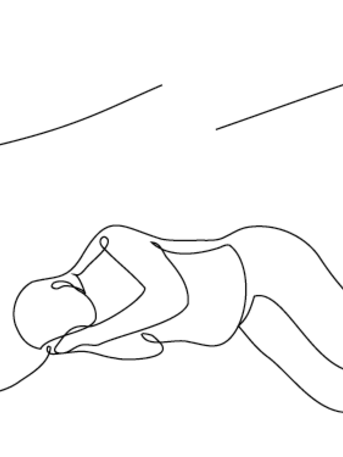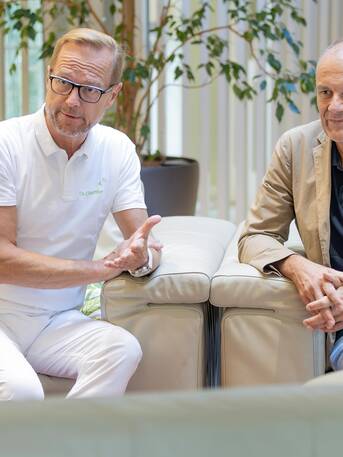Mental health
Self-esteem and mindfulness – striking a balance between one's own needs and respectful behaviour towards others.
In all the hustle and bustle of today’s demanding world, it is becoming increasingly important for many people to recognise and appreciate their own needs. At the same time, it is essential to treat others with respect. In this context of self-appreciation and mindfulness, the term "healthy selfishness" plays a central role. What strategies do we have at our disposal for recognising, appreciating and standing up for our own needs without neglecting the needs of others in our personal environment?
"A strong sense of self-confidence is the basis for recognising and appreciating our own needs. We know from studies and from our experience that self-reflection on a regular basis helps to strengthen self-confidence and self-acceptance," say Melanie Robertson and Thomas Blasbichler, the psychology team at Park Igls. Techniques such as keeping a diary or structured self-reflection exercises can help to systematically analyse and understand one’s own thoughts and feelings. One easy-to-implement example is self-observation, where you take a few minutes every day to reflect on your own experiences and emotions and document them in writing.
Mindfulness
Mindfulness – the conscious perception of the moment without judgement – is crucial for identifying needs. Regular mindfulness exercises such as meditation or breathing techniques can not only reduce stress, but also raise awareness of your own needs. "This is the aim of the meditation techniques that we offer at Park Igls. We always see the positive effects that these exercises have on emotional well-being and body awareness," says Melanie Robertson.
According to the experts, it is also essential to communicate or address your own needs in an appreciative and respectful manner without causing hurt or offence to others. As Thomas Blasbichler explains, "That's exactly what many people find quite difficult. Explanatory 'I' messages are an effective way to express one’s own needs and feelings and to promote understanding and cooperation. For example: 'I feel overwhelmed because I need more time for myself' or 'I don't want to do this now because I don't feel like it'.
Empathy & communication
Empathy and active listening are fundamental for respectful interaction. The ability to empathise with the perspective of others and understand their feelings promotes mutual understanding.
Acting responsibly means taking responsibility for your own decisions and their consequences, which requires commitment and integrity. People who demonstrate a high level of responsibility and integrity tend to be perceived as more reliable and trustworthy.
Practising self-care is not only crucial for one’s own well-being, but also for maintaining interpersonal relationships. Scheduled "me time," in which you pursue activities that are relaxing and good for you, leads to more well-being and reduced susceptibility to stress. “And a healthy lifestyle is the foundation for all this,” say the experts.
Healthy & negative selfishness
The term "healthy selfishness" refers to the ability to prioritise one's own needs and interests without being self-centred or inconsiderate. Healthy selfishness is an attitude or form of self-care that allows us to protect and strengthen ourselves in order to be there for others in the long term. "This is crucial to finding a balance between self-respect and respect for the needs of others," explains Melanie Robertson. The expert also says that setting clear boundaries at work and at home to protect yourself from overload, stress or burnout is an example of “healthy selfishness.”
Healthy selfishness must, of course, be distinguished from negative selfishness. Negative selfishness is asserting one's own needs and interests at the expense of others by, for instance, constantly dominating conversations without giving others space to express their opinions and feelings. "This often leads to conflict and destructive relationships because the needs and feelings of others are disregarded," says Melanie Robertson. “In contrast, healthy selfishness means respecting one's own needs as well as the boundaries and needs of others. This includes being allowed to say no when it feels right in order to protect your own needs."
Family structure & engrained patterns
"The way we are wired today has a lot to do with the patterns we have learnt or experienced in our families. This has a formative effect on us," explains Thomas Blasbichler. For example, many people have learnt from an early age to put their own needs aside in order to meet the expectations and demands within the family. Allowing themselves to say no is often extremely difficult for these people. As Melanie Robertson adds, "This is precisely what is so important when you realise that your own resources are exhausted. Recognising these patterns and consciously breaking them requires courage and self-reflection; very often this is best achieved with input and impetus from a neutral, external person."
Positive effects
Finding a balance between appreciating your own needs and treating other people with respect is not easy, but it can be learnt. Self-reflection, mindfulness, good communication, empathy, a sense of responsibility and self-care all help us to lead a fulfilling and harmonious life.
"This is an ongoing process that requires constant attention and adjustment, and you have to be aware of that. But if this process is successful, it will have a tremendously positive effect on your well-being and your interpersonal relationships," conclude the experts.
Burnout prevention
De-Stress
Learn how to cope with stressful situations, strengthen your own resources and deal with pressure. We support effective recuperation.
Explanatory "I" messages are an effective way to express one's own needs and feelings.







